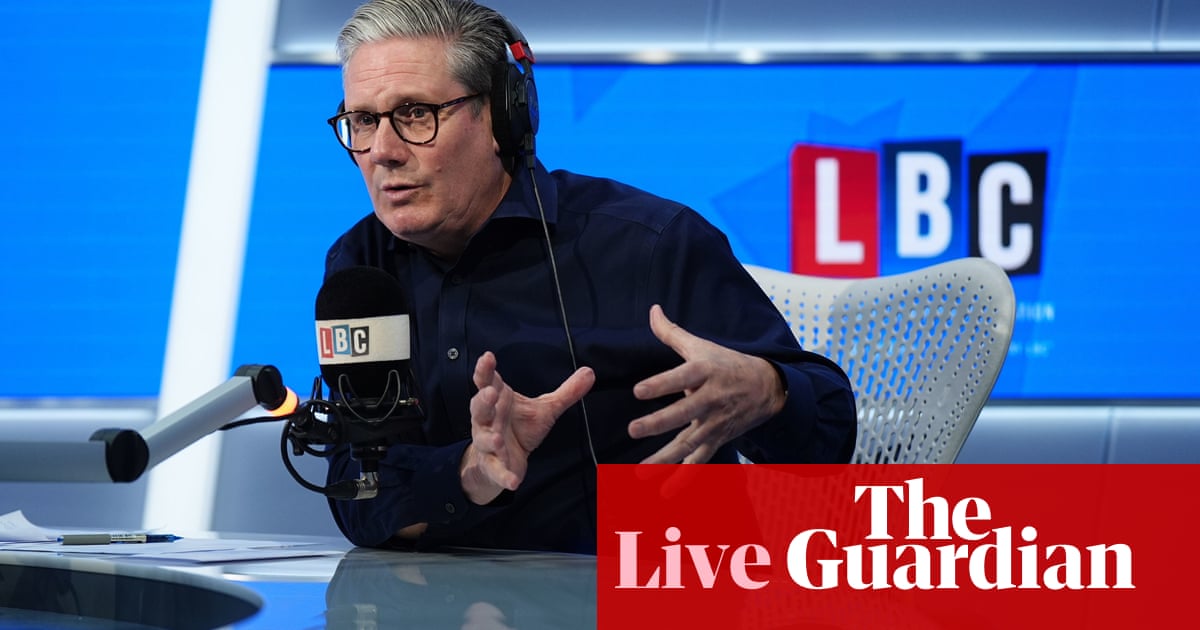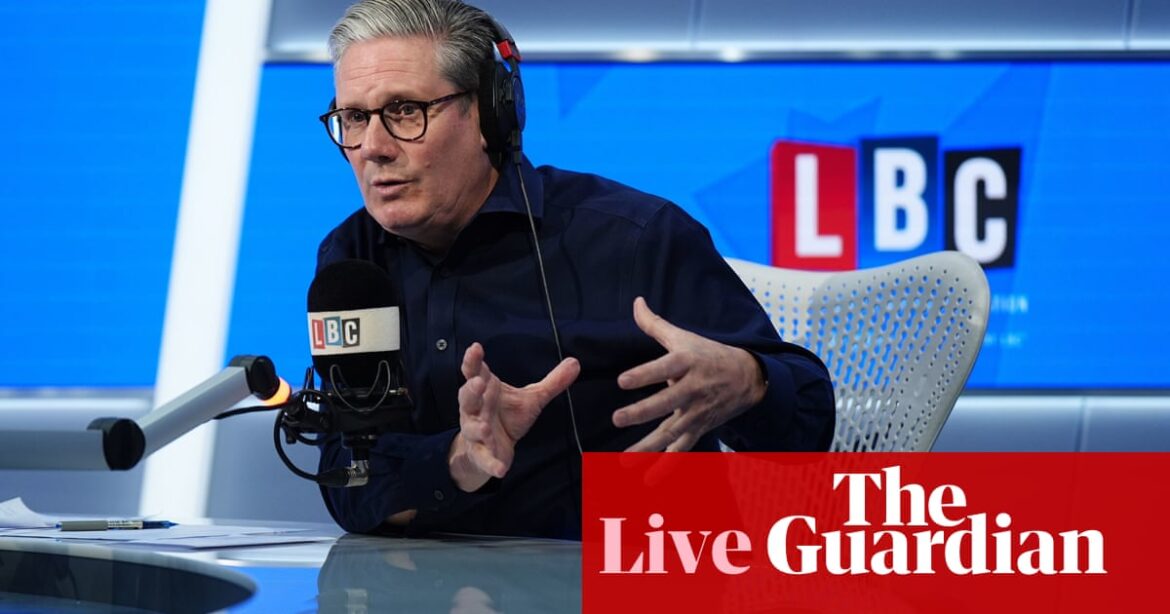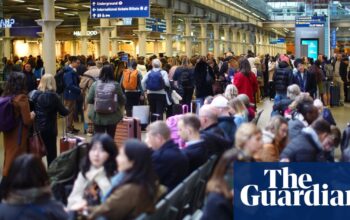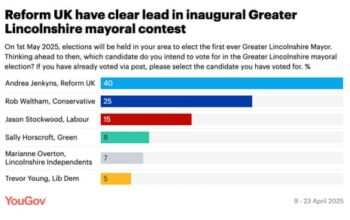
On two issues, he was particulary evasive. Starmer is determined not to admit publicly that anything he said about Jeremy Corbyn when he served in his shadow cabinet was a lie, and he wriggled repeatedly when asked if he would have served in a Corbyn cabinet. (See 9.34am.) It was not very dignified, and it served as a reminder of how other politicians can bat away questions like this more easily. Last week, faced with a similar hypothetical question, David Cameron brushed it off quoting Gino D’Acampo. “If my mother had wheels she’d be a bicycle, I don’t answer questions beginning with the word if,” he said. Starmer might have been better using a line like this. But does the Corbyn issue really matter that much? Voters know that when MPs praise their leaders during election campaigns, they are not always being 100% sincere, and no one following politics at the time ever believed that Starmer was a arch-Corbynista.
Second, Starmer refused to rule out council tax going up, in such a way as to suggest that he was not being candid. (See 9.23am.) This was odd, partly because council tax goes up in cash terms every year anyway for most people, but mainly because Labour seemed to deliberately shift its position on this yesterday, when Jonathan Ashworth said “we are not going to do council tax rebanding”. Was Starmer just not sure what the new line was? It is not clear.
The Telegraph website is currently leading on “Starmer suggests he would have served in Corbyn government”, but neither of his evasions felt like big campaign stories and what was perhaps most striking was just how confident he sounded. He admitted for the first time that he performance in the first debate had not been great (see 10.02am), he was quite withering about the Tories’ latest scaremongering (see 9.55am) and he seemed to be making a negotiating pitch to the BMA junior doctors’ committee, urging them to call off strike action pending talks with a Labour government next month (see 9.19am). In other words, he sounded like he knows he will be the next prime minister. All the evidence suggests he’s right.
Filters BETA
Rishi Sunak.
As Rachel Wearmouth says in a report for the i, Hunt made the comment at a meeting in Godalming and Ash, where he is facing a strong challenge from the Liberal Democrats. Hunt told the meeting:
When I was chairing the health and social care select committee I lobbied in parliament to have a long-term workforce plan for the NHS that was scientifically saying how many doctors we’ll need in 10 years, 15 years, 20 years and said let’s start training them now.
And I tried to persuade the chancellor, who was Rishi Sunak, and he said ‘no’ and then I became chancellor and he then said ‘yes’.
Hunt also said that his personal view was that the NHS had too many targets. He told the meeting:
The thing that I didn’t do [as health secretary] is scrap all the national targets that we have, which are a bureacratic nightmare. I should say this is not the policy of the government – this is what I happen to believe.
Stalin would frankly be proud of the number of the targets we have in the NHS and I think it is really holding us back.
Wearmouth argued that the fact that Hunt was making remarks like this to his constituents was evidence of the pressure he was under to win the seat.
1.43pm) by saying he should be included in the Rishi Sunak/Keir Starmer debate.
Rishi Sunak took a trip on a boat with Geoffrey Cox, the former attorney general and Tory candidate in Torridge and Tavistock to collect lobsters from lobster pots. Here are the pictures.
Scottish Labour’s Westminster manifesto in Edinburgh, Sarwar told an audience of candidates and activists “we know change for Scotland is a two-stage process” and that voters wanted to “turn the page … on 14 years of chaos under the Tories, and 17 years of failure under the SNP.”
Asked if he could specifically rule out any increase in any Scottish income tax band or rate – which are devolved to Holyrood – Sarwar responded definitively: “Yes. Next question.”
Both Labour and the Scottish Conservatives have attacked the SNP government at Holyrood over the fact that earners over £29,000 pay more in tax north of the border.
Launching the manifesto at Murrayfield Stadium on Tuesday morning, Sarwar said:
Thanks to the Tories, the average mortgage is now £2,000 higher per year. And thanks to the SNP, anyone earning £29,000 a year or more pays more income tax than people in the rest of the UK. Unbelievably, the SNP now think a nurse should pay more tax, but that oil and gas giants earning billions of pounds in profit should pay less tax.
At the last Scottish leaders’ debate, John Swinney justified his government’s “hard decision on increasing taxation for higher earners” as funding the Scottish child payment, which it estimates will keep 60,000 children out of poverty. Swinney’s immediate predecessor Humza Yousaf refused to back Labour’s plan to extend the windfall tax, arguing it would cost 100,000 jobs in the oil and gas sector.
The SNP leader has insisted his party will publish the only leftwing manifesto of the campaign tomorrow as he attempts to woo back independence supporters who polls indicate are turning to Labour.
The Scottish Labour manifesto largely mirrors UK Labour pledges on growing the economy, cutting NHS waiting lists and more support for young people set out by Keir Starmer last week, but with detail on how these will impact Scotland – VAT on private school fees, for example, could deliver over 1,800 new teachers while headquartering GB Energy in Scotland will make the country a “global leader” in the transition to clean energy.
Sarwar attacking “scaremongering” from the SNP that Labour’s plans would mean a return to austerity, stating:
It is now in black and white in the UK and Scottish Labour manifesto there will be no return to austerity under a Labour government.
an interview with the Sun, Rachel Reeves, the shadow chancellor, said the paper had been right to campaign to freeze beer duty.
Asked about Reeves’ comment, Starmer said:
I think it is important that we support hospitality and the beer duty is part of the package there. I am glad and obviously support what Rachel has already said.
Keir Starmer has said he is “concerned” about the impact of the law introduced by the Conservatives requiring people to produce photo ID to be allowed to vote in general elections.
Labour has not committed to repeal the law, but Starmer confirmed that his party will review how it operates if it wins the election.
In an interview with Sky News, asked why he was not going to scrap the law, Starmer replied:
The first thing I’d say is, remember, every person who’s watching this, you do need ID going into this election.
Obviously there’s been a review into the impact, and there will be a review into this general election on the impact of ID. So we’ll look at that in due course.
I think we need to review and look at the ID rules. I am concerned about the impact. I won’t shy away from that. But my message today is remember your ID when you go to vote this time around.
The photo ID law applies to all Westminster elections in Britain, local elections in England, and police and crime commissioner elections in England and Wales. Northern Ireland already had a photo ID requirement.
The government claimed the measures was needed to combat electoral fraud, and perceptions that cheating at elections was too easy. But there are very few reported cases of people voting under a false name in British elections, and critics alleged the law was introduced by Tories in the hope that it might reduce the number of leftwing people casting a vote.
At a Tory event last year Jacob Rees-Mogg, the former cabinet minister, seemed to confirm this when he said: “Parties that try and gerrymander end up finding their clever scheme comes back to bite them, as dare I say we found by insisting on voter ID for elections.”
There was fresh evidence of this recently when the Times published extracts from a memo written by Johnny Mercer, the veterans minister, saying that his bid to get No 10 to allow people to use the veteran’s card as ID when voting was blocked because they argued it would “open the floodgates” to students using their student ID too.
The Electoral Commission was in favour of some ID requirement for people voting, but was surprised when ministers insisted that only certain types of photo ID would be permitted. A review could lead to a wider variety of ID being deemed acceptable.
reports that the Conservatives plan to distribute tens of thousands of letters signed by the former PM, Sunak said:
It’s great that Boris is supporting the Conservative party, I very much welcome that.
He is endorsing many candidates in videos and letters which have been coordinated by the campaign.
I know that will make a difference and, of course, every week he is making the case in his column and making sure that everyone understands what the Labour government would do to this country and why it’s important that everyone votes Conservative and I’m glad he’s doing that.
In truth, Sunak may not feel as posititive about Johnson getting involved in the campaign as these comments imply. The two men have a frosty relationship, with Johnson blaming Sunak for helping to force him out of office, and according to a report by Ben Riley-Smith in the Telegraph today, they have not spoken during the campaign. Johnson has already been recording video messages backing some Tory candidates – but predominantly they are his supporters, and they include Simon Clarke, the former levelling up secretary, who called for Sunak’s resignation earlier this year.
a majority of 272. Its MRP with Find Out Now had Labour on course for a majority of 302. The YouGov MRP had Labour heading for a majority of 194. More in Common’s MRP was much more pessimistic – pointing to a Labour majority of just 114. But the Survation MRP for Best for Britain, published in the Sunday Times this weekend, had Labour looking at a majority of 262.
The More in Common projection (the worst for Labour from these five) has Labour winning 382 seats. The Find Out Now one (the best of the five for the party) has Labour getting 476 seats.
In a fascinating post on the Comment is Freed Substack yesterday, the elections expert Dylan Difford examined in detail all the various electoral records the result next week might break. His article is well worth reading in full, but this is what he says about milestones that Labour might pass.
Getting into the 390s [number of seats] puts Starmer on a par with the landslides of Clement Attlee in 1945 and Margaret Thatcher in 1983.
420 seats are needed to top Blair’s seat haul, but owing to there being fewer seats than in 1997, 415 will be enough to secure the largest majority in post-war Britain.
Climbing to 430 seats would see Starmer in charge of the largest single-party majority since the introduction of majority male suffrage, overtaking the Conservatives’ landslide from a century ago, while 447 would create a majority larger than that attained by the National Government parties in 1935.
Surpassing the 493-seat majority of the National Government in 1931, however, seems fanciful, requiring Labour to take 540 seats. However, some models do suggest that overtaking the 470 seats won by the Conservatives in that election is not wholly implausible, which would be the most seats ever won by one party in a western democratic election.
And this is what Difford says about precedents for how few seats the Conservatives might be left with.
Falling below a third of seats (217) would be fairly universally regarded as a severe defeat, but it is collapsing beneath the 165 seats won in 1997 that would indicate the worst result for the party in living memory. Returning fewer than 156 MPs, or 151 if you wish to be proportional to the size of the Commons, would replace 1906 as the party’s worst result since it was founded in 1834; this should be the expectation according to most prediction models. Surpassing the 106 seats (proportionally 123) won by the Tory faction in the 1754 election would truly be hitting rock bottom, while not being able to top the 52 seats clung on to by the remnants of Labour in the 1931 election would signify a wipeout.
The More in Common projection has the Tories winning 180 seats this time. Find Out Now has them down to 66.
Source: theguardian.com



